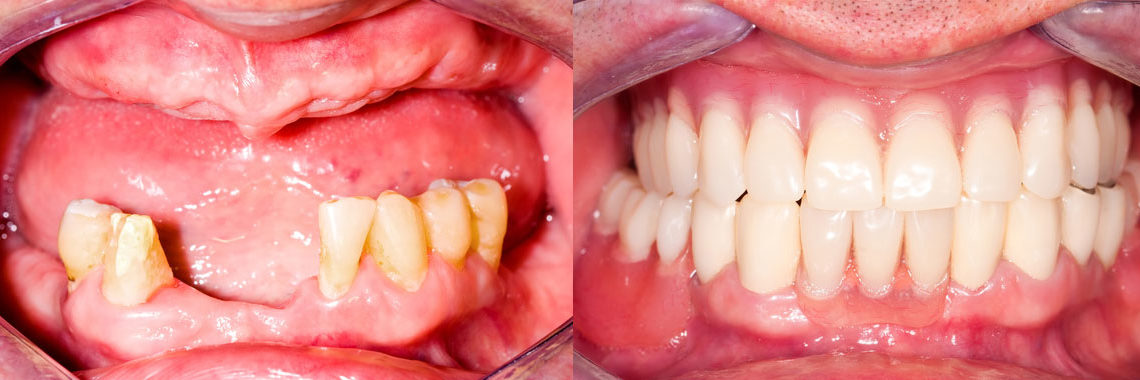When you have an imperfect smile, tooth replacement is something that many patients consider to get their smile back and help them gain self-confidence. Some dentists prefer traditional dental implant methods, while others are more intrigued by more modern procedures. What is the difference between these methods, and which one is right for you?
Traditional Dental Implants
Reconstructing the full arches of the of teeth has been done the same way for decades, and it is a very effective method of tooth replacement, but it takes a long time to complete the process, so patients could be without teeth for a period of two years or more. With this process, the first step is removing the old teeth that are no longer viable. Then, we will take a look at your jaw to see if there is a need for sinus lifting or bone grafting. These procedures are typically required when the teeth are loose, falling out, or infected. If these procedures are required, the entire implantation process will take longer than it would in a patient who has a jawbone that is ready for the procedure. Once the procedure is complete, a period of six to nine months will be required to allow the patient’s gums and jawbone to heal.
Once the gums have been built up and prepared, then the process of actually inserting the implants can begin. It does not take a long time for the implants to be positioned in the gums, but it will require another six months to allow the bones around the implant to heal. Before your dentist continues the procedure, there will be an appointment scheduled to make sure that the implants are properly fused to the jawbone. Typically, an x-ray will be taken to confirm this.
Once the area around the implants are fully healed, the implants will be uncovered, and a healing abutment or cap is screwed onto the implant. After another two-week healing process, the crown or the replacement teeth are attached to the abutment. During this process, removable dentures can be used in some cases so that patients do not need to be completely without teeth.
Same Day Tooth Replacement (All-on-4)
This new way of doing dental implants is one that helps speed up the process so that patients do not need to wait for years to get their new smile. With the same day tooth replacement, there is never going to be a need for removable dentures, unless a patient already had them before beginning the process of getting implants. Not everyone is going to be able to get this type of dental implant, but whether you are an ideal candidate will rely on the condition of your gums in the area where you need the implant.
The first step of the same day tooth replacement is to remove the tooth that needs to be replaced. The entire root will need to be removed without damaging the gums surrounding the area. Next, the new implant is placed in the gum where the root was previously so that it can fuse with your jawbone like your teeth normally would. Finally, the crown attaches to the implant and fills the gap in your mouth.
There can be a lot of risks associated with this procedure because your gums and jaw will not have a chance to heal before the crown is placed on the implant. This means that there can be pressure from biting on the implant that will cause it to shift in your gums before it is properly fused to your bone. If this occurs, the implant could be loose in your gum. Infection could also set in if there are any problems with the area around the implant healing properly.
Which do We Recommend?
Both of these procedures have relatively high success rates, but Dr. Bruce Vafa, who is a Beverly Hills dental implant specialist, prefers to work with traditional dental implants because of the risk that is involved with the all-on-4 treatment. A traditional treatment may be a longer process, but it is one that will ensure that unnecessary complications do not arise. For a full consultation, contact us on our website or call our office today at (310) 201-9001.



